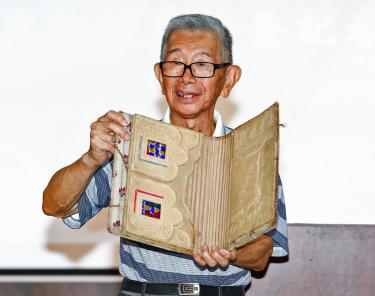Hsu Kui-piao (許貴標), 82, recently donated a papier-mache scrapbook that seemed like an ordinary item at first glance. However, Hsu’s gift embodied the persecution and sacrifice suffered by Taiwanese during the White Terror era and the remarkable friendship among condemned political prisoners.
“This is the 55th year since I was released from prison. I have the good fortune to share my story here, but my heart is stirred up with strong emotions,” Hsu said as he presented the book to the Preparatory Office of the National Human Rights Museum on Tuesday last week.
The former prisoner said that informants falsely accused him of “failing to report known Communist spy activities to the authorities” in 1954, which led to a seven-year jail sentence.
The White Terror era refers to the Chinese Nationalist Party (KMT) regime’s persecution of political dissidents in Taiwan for nearly four decades until the lifting of martial law in 1987.
Hsu said the papier-mache book was made by two fellow prisoners, Wu Peng-tsan (吳鵬燦) and Lien Te-en (連德恩), when they were incarcerated at the military prison on Qingdao E Road in Taipei. The Taipei Sheraton Hotel now occupies the site.
Locked up on sedition charges, Wu and Lien understood that they had little chance of coming out alive, given that death sentences were meted out for sedition during the Martial Law era. Seeing that Hsu had the chance to be freed after serving his sentence, Wu and Lien decided to dedicate a gift to him, Hsu said.
With stones and empty cans collected during their brief times in the prison courtyard, the two condemned political prisoners secretly made small razors.
Using the razors and other improvised tools, they made papier-mache materials by cutting up packaging papers from parcels and clothing items given by family members during prison visits. The glue was made by soaking rice from leftover meals in water, Hsu said.
Wu and Lien made the book in secret and under difficult conditions, away from the prying eyes of the prison wardens who were on regular patrols, Hsu said.
“It took them three months to finish. With painstaking efforts, they embossed my name on it, along with an embossed picture of a ship sailing out on the sea,” Hsu said.
“Each time that I see this sailing ship, my mind always contemplates whether my two friends were giving me their blessing to sail on with success in my endeavors after getting out of prison, or whether they wanted to express the feeling that ‘We are bound by fate on the same ship?’” he said.
Not long after Wu and Lien completed their task and presented the book to Hsu, they were executed.
“With my own eyes, I saw Wu and Lien being marched out by guards, taken away to be executed. I could only watch and bid farewell to my friends with streams of tears,” Hsu said, choked with emotion.
Hsu stressed that “our democracy and freedom were won with the lives, blood and tears of many who went before us.”
“This ordinary-looking book is soaked with the blood and sacrifice of two outstanding young men. It is an eyewitness to the horrible atrocities of White Terror era,” Hsu said. “It is my hope that all 23 million Taiwanese can truly live in a free and democratic society.”
The papier-mache book had always been Hsu’s most treasured possession, where he kept the original indictment papers and the court ruling documents on his case.
Hsu said he decided to donate it “so Taiwanese can preserve the memories of the White Terror era and it will not be forgotten through the passage of time.”
Source: Taipei Times - 2014/08/31





















